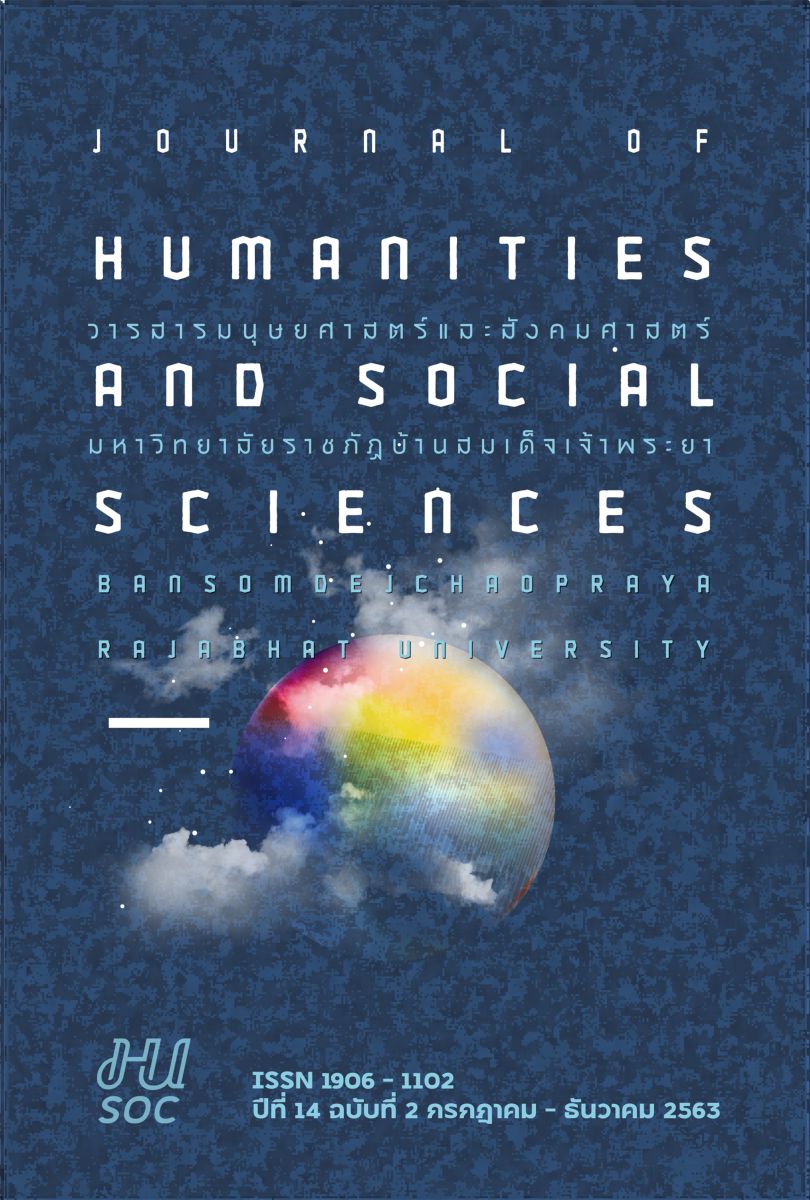Development of Ethical Learning Management Modeling for Secondary Students using Information and Communication Technology
Keywords:
Ethical Learning Management Model, Ethics in Information Technology Usage, Ethic in CommunicationAbstract
This study was conducted with three main objectives; 1) to analyze ethical factors in terms of information and communication technology (ICT) usage for secondary students, 2) to develop an ethical learning management model using ICT, and 3) to study the results of a learning management model trial for secondary school students using ICT. The study population consisted of ICT administrators and teachers and 6,424 students taking Mattayomsuksa 6 exams at schools under Secondary Education Service Area Office 39. The research sample consisted of 381 students studying Mattayomsuksa 6 in academic year 2019. A stratified sampling method was used to calculate the sample size for a given population using tables developed by Krejcie and Morgan. The research instruments were interview, questionnaire, focus group discussion, lesson planning, knowledge test, attitude questionnaire and a moral reasoning test as well as a behavioral observation form. Data were analyzed by applying confirmatory factor analysis (CFA), mean, standard deviation and t-test. Results were as follows. 1) Confirmatory factor analysis revealed four factors (latent variables) as 1. ethical knowledge of ICT usage, 2. ethical attitudes toward ICT usage, 3. ethical reasons for ICT usage, and 4. ethical behavior for ICT usage. The 48 observable variables and all the key elements in the model were also consistent with the empirical data (p-value = 0.06, Chi-Square = 1841.690, df = 1042, p = 0.021, CFI= 0.912, Tucker Lewis index = 0.905, RMSEA = 0.045, SRMR = 0.040). 2) Findings also indicated that the model elements consisted of principles and concepts of learning management modeling objectives, content and processes. Four steps of measurement and evaluation for practical use of the learning management model were identified as planning, follow-up, observations and reflections, and summary. Evaluation by experts determined that model propriety was at the highest level. 3) In terms of the model trial, level of ethical understanding, attitude, reason, and behavior of students toward ICT usage in post-learning were higher than at the pre-learning stage at a significance level of 0.05. Results of students’ satisfaction toward the ethical learning management model in terms of ICT usage were also at the highest level.
References
กระทรวงศึกษาธิการ. (2551). หลักสูตรแกนกลางการศึกษาขั้นพื้นฐาน พุทธศักราช 2551. กรุงเทพฯ: สำนักงานทดสอบทางการศึกษา กรมวิชาการ.
กระทรวงศึกษาธิการ. (2560). หลักสูตรแกนกลางการศึกษาขั้นพื้นฐาน พุทธศักราช 2551 (ฉบับปรับปรุง พ.ศ. 2560). กรุงเทพฯ: โรงพิมพ์ชุมนุมสหกรณ์การเกษตรแห่งประเทศไทย.
ณัฐวุฒิ กิจรุ่งเรือง. (2545). ผู้เรียนเป็นสำคัญและการเขียนแผนการจัดการเรียนรู้ของครูมืออาชีพ. กรุงเทพฯ: สถาพรบุ๊คส์.
ดวงเดือน พันธุมนาวิน และเพ็ญแข ประจนปัจจนึก. (2550). จริยธรรมของเยาวชนไทย. กรุงเทพฯ: สถาบันวิจัยพฤติกรรมศาสตร์ มหาวิทยาลัยศรีนครินทรวิโรฒ ประสานมิตร.
ปิยะนันท์ ภิรมย์ไกรภักดิ์. (2544). การส่งเสริมจริยธรรมในโรงเรียนมัธยมศึกษาสังกัดกรมสามัญศึกษา จังหวัดนนทบุรี. วิทยานิพนธ์ศึกษาศาสตรมหาบัณฑิต สาขาวิชาการบริหารการศึกษา มหาวิทยาลัยเกษตรศาสตร์.
ยืน ภู่วรวรรณ. (2550, มกราคม - มิถุนายน). จริยธรรมไอซีที. วารสารไมโครคอมพิวเตอร์, 2(258), 1-2.
สถาบันรามจิตติ. (2557). สมุดข้อมูลรายตัวบ่งชี้รายจังหวัดรายงานสภาวการณ์เด็กไทย และเยาวชน ปี พ.ศ. 2557 – 2558. กรุงเทพฯ: สํานักพิมพ์แห่งจุฬาลงกรณ์มหาวิทยาลัย.
สำนักงานเลขาธิการสภาการศึกษา. (2560). รายงานการประเมินการจัดการเรียนรู้ที่ส่งเสริมคุณธรรมจริยธรรมของผู้เรียนในสถานศึกษาขั้นพื้นฐาน. กรุงเทพฯ: โรงพิมพ์แห่งจุฬาลงกรณ์มหาวิทยาลัย.
อัจฉริยาภรณ์ รักตลาด. (2563). โมเดลการวิเคราะห์องค์ประกอบเชิงยืนยันรูปแบบการจัดการเรียนรู้ด้านจริยธรรมในการใช้เทคโนโลยีสารสนเทศและการสื่อสารสำหรับนักเรียนระดับมัธยมศึกษา. อุตรดิตถ์: โรงเรียนวัดคลองนาพง.
Joyce, B. & Beverly, S. (1982). The Coaching of Teaching. Educational Leadership. 40, 4-8.
Joyce, B., Weil, M., & Calhoun, E. (2009). Models of Teaching. (8th ed.). New York: Allyn&Bacon.
Kant, I. (1972). The Right of Punishing and of Pardoning. In Freedom and Responsibility. California: Stanford University Press.
Downloads
Published
How to Cite
Issue
Section
License

This work is licensed under a Creative Commons Attribution-NonCommercial-NoDerivatives 4.0 International License.




